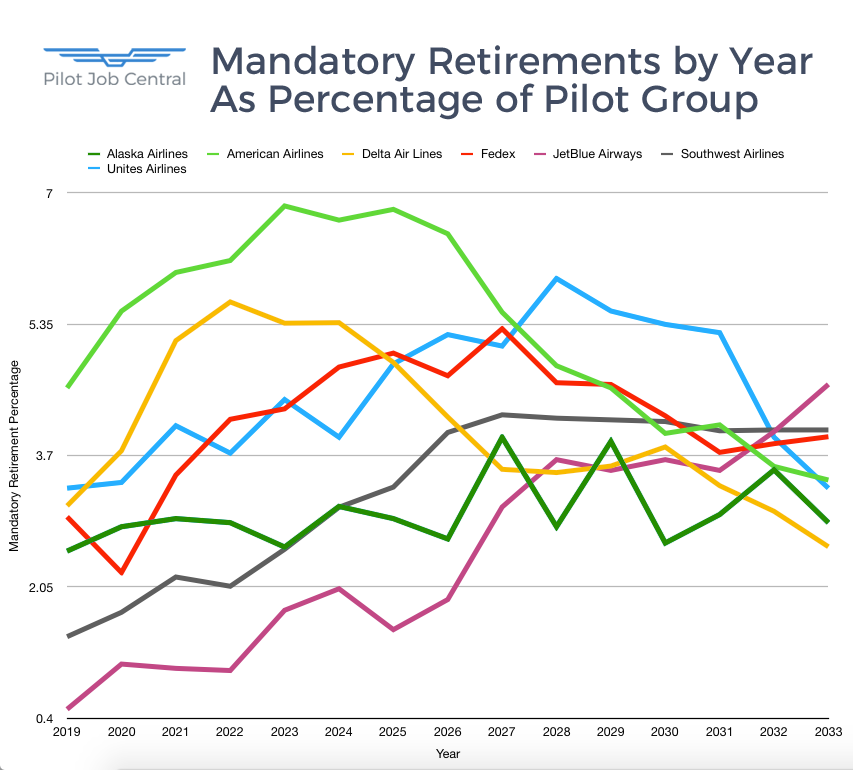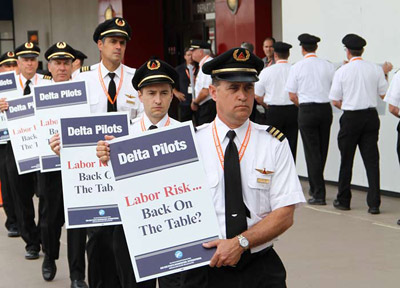8 Strategies for Finding a Better Pilot Job

As the pilot shortage deepens demand for pilot services will continue to increase. Unprecedented opportunity lies ahead for those that know how to leverage their position in the market. Learn 8 strategies to take advantage of the current job market and find the best pilot job for you.
1) Know Your Value Before Searching
Compensation has changed dramatically for professional pilots through the decades. Current market forces have pilot pay on a rapid upswing.
It is important for pilots to know the market rates for the positions they are applying to. They need to know whether an employer is offering competitive compensation. Some employers may be having continual open positions because they aren’t keeping up with recent compensation hikes.
Look at Total Compensation
 Compensation includes more than just pay rates. Also be aware of industry standards for:
Compensation includes more than just pay rates. Also be aware of industry standards for:
- Health insurance, vision plans, dental insurance, and life insurance.
- Retirement plans. Some sectors in aviation may have pensions or high 401K employer contributions or matches. Entry level pilot jobs usually have average retirement plans compared to other industries. Major airlines and other employers at the top of the pilot career usually have significantly better retirement plans than other professional occupations.
- Paid time off (PTO) – to include vacation as well as sick time. Some employers will lump all PTO into a single pool and then use marketing tricks to advertise this as vacation time. Try to look into company PTO policies and pilot staffing levels to see if you will actually be able to take time off or if an employer has clever road blocks in their employment handbook to keep pilots on the job as much as possible.
- Sign-on bonuses are common for new-hire pilots. When considering bonuses pay particular attention to the conditions around those bonuses. Employers will advertise the total value with the conditions or schedules of those bonuses cleverly masked. Anytime you see a bonus marketed as “up to (insert big bonus amount)” be especially wary.
There are so many opportunity available to pilots that most are better served moving on to another opportunity if an employer is unwilling to pay market appropriate rates or seems like they are trying to hide specific details around compensation packages.
2) Know Your Priorities and Values
Before starting out on your pilot job search create a list of your values and priorities. These should include both the priorities for your personal life and your professional goals and work environment.
Do you want to advance up the pilot career ladder fast? Then find jobs where you will get a lot of flight time, where you will advance into more complex airplanes faster, or where upgrade times to captain are faster.
 Do you value time at home with your family? Then you will need to focus on pilot jobs that minimize traveling or where staffing levels provide for a better work/life balance.
Do you value time at home with your family? Then you will need to focus on pilot jobs that minimize traveling or where staffing levels provide for a better work/life balance.
Example Working Condition Priorities
- Independence/Autonomy
- Time Flexibility
- Variety of Work
- Stability or Security in a Position
- Mentally Challenging
- Time Pressures
- Pressure to complete a mission
- Travel
- Contact With Customers or the Public
- Work alone or in a team
Example Professional Pilot Goals
- Flying more complex airplanes
- Advancement in pilot position (ex. – first officer to captain)
- Career advancement into pilot training or manager rolls (ex. – check airman or chief pilot)
- Additional Pilot Ratings or Certificates
- Increasing compensation
Example Personal Life Priorities
- Spending time with friends and family
- Hobbies
- Where You Want to Live
- Homeownership
- Having Holidays Off
- Consistent Work Schedule
3) Evaluate Pilot Seniority Lists
Pilot seniority numbers are commonly used with pilot employers, both union and non-union. Your seniority number will dictate your professional life. It will determine the airplane you fly, your schedule, the holidays you are able to take off, the positions and bases you are able to hold, your priority when traveling space available, and whether you will be safe from furlough during downturns.
Your compensation and quality of life is going to hinge on your seniority number.
It is important to analyze each employer’s seniority list and compare them when deciding between companies you want to apply to. Each pilot employer goes through cycles where there will be significant movement within their ranks while other times seniority movement stops.
If you time it right you can advance quickly through the ranks of an employer and be able to hold the position, base, and schedules that you want. You will maximize your earning potential. If you time it wrong you might be stuck for many years on reserve, in an undesirable base, with bad schedules, and with no options for upgrading from first officer to captain.
It is important to be aware of the condition of an employer’s seniority list when considering applying. Each pilot employer goes through cycles where there will be significant movement within their ranks and there will be other times when that movements stops. Things to be aware of are upcoming mandatory retirements, fleet growth plans, and where an employer is at in a hiring cycle.
Mandatory Retirements
One of the more reliable ways to assess a pilot seniority list is through upcoming mandatory retirements. Within airline operations pilots may not legally work past age 65. Upcoming mandatory retirements is a sure indicator of seniority list movement that cannot be avoided.
Learn More On Improving Your Career by Evaluating Pilot Seniority Lists

Pilot Hiring Cycles
Pilot employers will go through pronounced peaks and valleys in pilot hiring. Hitting the front edge of a pilot hiring cycle means you can gain seniority quickly. Hitting a hiring cycle on the backend means you may stagnate at a low seniority number.
It is difficult to time hiring cycles. Indictors to be aware of are general economic conditions and to be aware when employers first announce significant hiring plans.
Airplane Fleet Growth
When there is a net increase in airplane fleet size the operator will need more pilots to staff their operation. An increase in the size of a pilot group means upward seniority movement for everyone in the ranks.
When looking at an employer’s airplane orders be aware that total orders is not a direct indication of fleet growth. At least some of the new airplane orders are likely going toward airplane replacements.
4) Compare Apples to Oranges
When comparing employers to each other go beyond just pay scales and compensation.
Look deeper into how pay charts align with upgrade times. If an employer has a 4 year upgrade from first officer to captain and another employer has a 2 year upgrade, make sure to compare year 3 captain pay on the shorter upgrade to year 3 first officer pay on the longer upgrade.
Know how long it will take to upgrade between different fleet types and how those fleet types align with your priorities. For example – narrowbody fleets vs widebody fleets. At most employers the wide body airplanes are more senior. But there is a well known cargo pilot employer where the widebody fleet is junior. At that employer the pay scales are the same regardless of the plane type flown and pilots generally prefer the schedules of the narrowbody airplanes.
Look at seniority lists compared to bases and whether you will be able to base yourself where you want in a reasonable time period. Determine seniority list composition and the relative seniority of bases. Some bases will be primarily held by junior pilots while others can only be held by senior pilots. This varies between employers who share the same bases.

Compare the general state of the employers you are considering. Some things to keep in mind are:
- Management philosophy
- Airplane orders and growth plans
- Were there any recent mergers? (hint – sometimes there can be less than ideal working conditions in the years following a merger of pilot groups)
- Are the employer’s operations volatile or generally stable? That is, does the employer go through frequent base openings/closings or do they go through more hiring booms and furloughs than average.
5) Don’t Chase an Airplane Type
You may have a favorite airplane type. And you may dream of flying that airplane. But avoid tunnel vision in pursuit of flying your dream airplane.
As you begin your pilot job searching make sure and list out your values and priorities as mentioned above. Run through available employers and consider:
- how they align with your values and priorities
- analyze other factors with employer you are considering (such as seniority list) to determine which best fits your needs and gives you the greatest quality of life
Chasing a specific airplane type will rarely be the best strategy for maximizing your pilot career.
6) Promises Not in a Collective Bargaining Agreement are Easily Broken
In a hot pilot job market recruiters will promise the moon. They have quotas to fill and will often say whatever they need to to get your application.
If a promise is made to you when you are a prospect keep in mind that any promise not included in a collective bargaining agreement (CBA) cannot be counted on. CBAs are agreements between unionized pilot groups and employers.
An employer may offer a lofty new-hire bonus only to then fine-print you out of actually getting it. Or they may show you the entirety of a bonus amount to make it seem more appealing only to have it spread out over multiple years and after reaching multiple different conditions.
Bonus promises aren’t the only ones you need to be wary of. If a recruiter is promising you a specific base or position that may not be what you get after you start training.
It is a good practice to take each offer with a grain of salt. Compare the worst case with each employer in addition to any lofty promises made.
7) Be Open to Joining Both Union and Non-Union Pilot Groups
 Labor unions are highly politicized. To throw a pilot job out of contention for not conforming to your viewpoint on this would be to severely limit your options. Most air carrier pilot jobs have unionized pilot groups while most pilot jobs that would keep you home most nights are non-unionized.
Labor unions are highly politicized. To throw a pilot job out of contention for not conforming to your viewpoint on this would be to severely limit your options. Most air carrier pilot jobs have unionized pilot groups while most pilot jobs that would keep you home most nights are non-unionized.
Your primary consideration should be to find the pilot job that best fits your priorities and needs and which gives you the best opportunity to advance into a position that you want.
Advantages of a Unionized Pilot Job
Some advantages of working in a unionized pilot job include:
- Higher compensation
- More formal disciplinary processes where pilots have representation and management is required to follow a detailed process prior to punishing a pilot
- Less variation in work days as the CBA spells out specific work rules that govern how a pilot is to be used
- Most unionized pilot groups have different committees that allow for a voice in different aspects of operations and other factors that impact quality of life
Advantages of a Non-Unionized Pilot Job
Some advantages of working in a non-unionized pilot job include:
- Less strife between managers and pilots
- These companies are sometimes on upward growth curves with more opportunity to advance quickly in seniority
- Most of the pilots jobs that would have you home every night are non-union
- More opportunity for merit-based promotions
8) Listen to the Feedback From Pilots Already Working at a Company
 There is no better way to gain insight into a specific position than from the pilots currently working. The trick is finding pilots to gain insight from. You can get feedback from online forums such as Airline Pilot Forums. If you are already in the pilot career working your way up there may be contacts you can find either through your current employer or through your flight school.
There is no better way to gain insight into a specific position than from the pilots currently working. The trick is finding pilots to gain insight from. You can get feedback from online forums such as Airline Pilot Forums. If you are already in the pilot career working your way up there may be contacts you can find either through your current employer or through your flight school.
When soliciting feedback keep in the mind that within every pilot group there are going to be people that are always negative, there will be those employees that are irrationally exuberant about their job, and there will be pilots in between the two extremes. Be wary of new hires as many employees are in a honeymoon phase for the first year or two. Keep in mind that people expressing views in online forums are often venting frustration. Forums may have a more negative tone than how the average pilot feels at an employer.
Greg started his professional pilot journey in 2002 after graduating from Embry Riddle. Since that time he has accumulated over 8,000 hours working as a pilot. Greg’s professional experience includes flight instructing, animal tracking, backcountry flying, forest firefighting, passenger charter, part 135 cargo, flying for a regional airline, a national low cost airline, a legacy airline, and also working as a manager in charge of Part 135 and Part 121 training programs.



